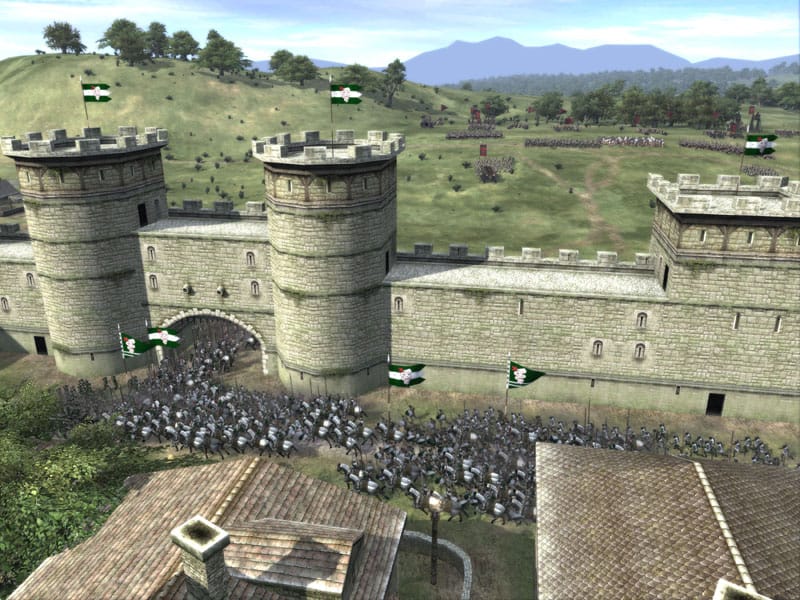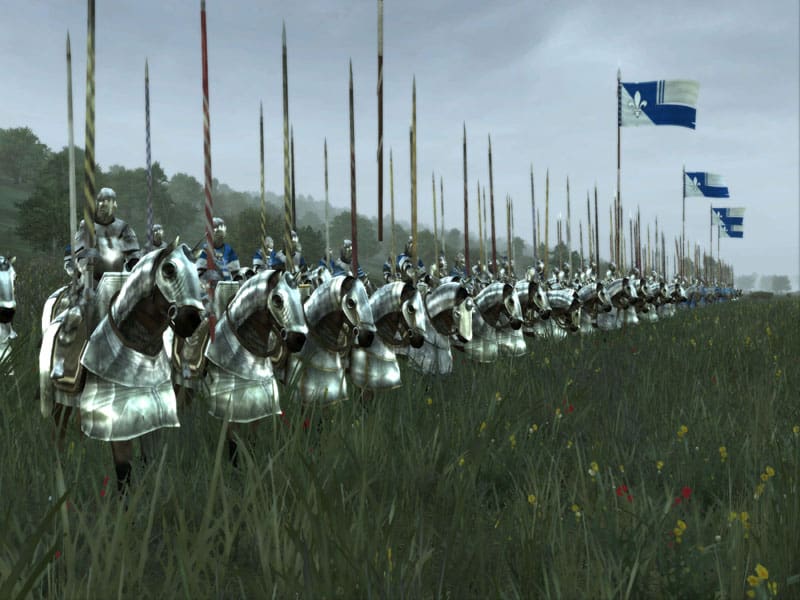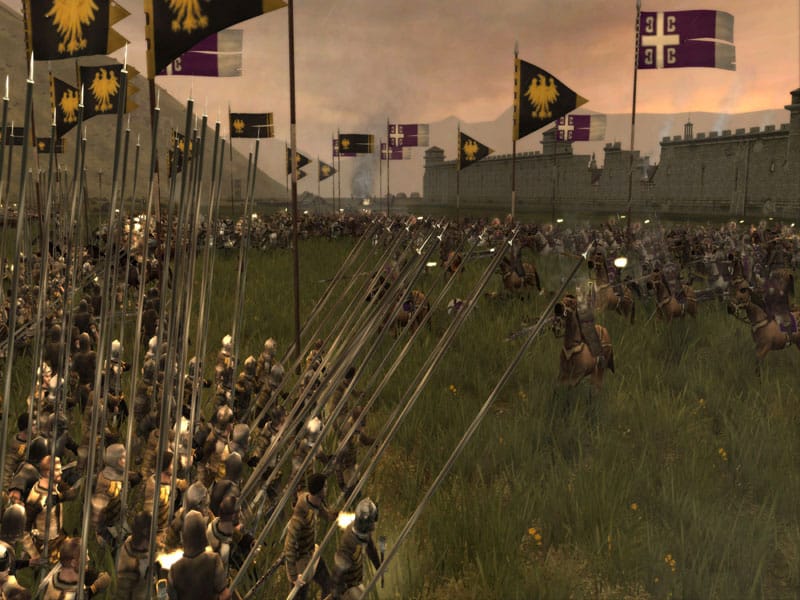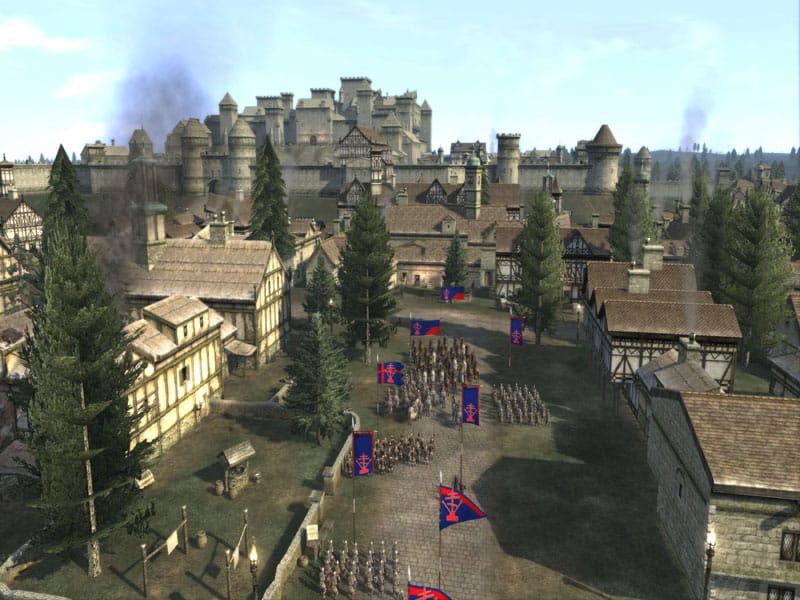Medieval II: Total War is a strategy game and part of the larger and supreme popular Total War franchise. It takes players back to the exciting medieval era with knights in shining armor, towering castles, and epic battles. The British developer by the name of Creative Assembly created the game with the help of publisher Sega. The game features a unique dual nature with both real-time tactical aspect and turn-based strategy, that offer players various challenges.
Medieval II: Total War Premise
As mentioned, Medival II: Total War‘s two different forms of strategic gameplay are involved in the game. Players can direct their campaign with turn-based controls while also micromanaging the troops in exciting real-time tactical battles. There’s also an option to skip battles by resolving them automatically for those that want to focus on the strategic aspects. The storyline takes place between 1080 and 1530, in a medieval era. The large map covers not only Europe but parts of the Middle East and North Africa, as well.
The players’ goal is to build the strength of their military and use it and other assets to increase influence around the game’s world. This might involve political and economic strategies in addition to military conquest. In the campaign, there are a total of seventeen factions to choose from. Each of these factions come with distinct circumstances and enemies surrounding their lands.

There are different kinds of campaigns to choose from, depending on how deep into the game one wants to delve. Winning a short campaign requires defeating only one or two enemies, while a longer one might add more territorial requirements and even conquest of an important city, like Rome.
Medieval II: Total War Characters
In the game, players assume the lead of various factions, and each faction has various characters available. These characters offer different abilities that help the faction to succeed in different aspects of the game. Much of the focus in Medieval II: Total War is also on the factions themselves, as players create their own stories as the leader of their own empires. Each faction also comes with unique strengths and weaknesses that affect the economy, diplomacy, military, and much more.
Here are all the factions that are available to the player:
- The Byzantine Empire: Has strong heavy cavalry, missile cavalry, and archer units. However, doesn’t have the advantage of gunpowder.
- Denmark: The military is well-versed and has a mixture of good troops, although doesn’t have great heavy cavalry. The infantry prefers wielding swords or axes instead of spears, which isn’t great against cavalry.
- Egypt: Known for their powerful cavalry units, especially the Mamluks that ride with spears. However, doesn’t have good heavy infantry options.
- England: England is best known for their strong longbowmen and infantry units. The cavalry units are not on the same level, though.
- France: Unlike England, France has perhaps one of the best heavy cavalry units in the entire game. While infantry is decent in the later game, early-period infantry can be lackluster.
- The Holy Roman Empire: A capable army in most terms, but doesn’t have the strength in the later period of nations like France and England.
- Hungary: Hungary can rely on its multitude of cavalry units, including knights with heavy armor and horse archers with high maneuverability. However, Infantry isn’t as good.
- Milan: Has good militia infantry as well as crossbowmen, but doesn’t offer strong cavalry options.
- Moors: Relies on a strong early-period army with a balanced mix of light cavalry and infantry. Good against cavalry with spears. Drops off in the later period.
- Poland: Poland is another faction with fairly strong cavalry units, but does lack great infantry.
- Portugal: Not very good in the professional army department, like The Holy Roman Empire. However, has great infantry, cavalry, and naval options.
- Russia: One of the better cavalry factions, with valuable melee and ranged cavalry. Not nearly as good with early infantry units.
- Scotland: Scotland’s strength is in infantry units wielding spears and pikes. While they don’t offer great options in cavalry units, they are good at defending against them.
- Sicily: Relies on militia, knights, and archers. On the other hand, in the later period doesn’t have good cavalry.
- Spain: Spain is a naval powerhouse with fairly strong light infantry and cavalry. Weak heavy infantry and anti-cavalry options.
- The Turks: Perhaps the game’s best ranged cavalry with mounted archers. In the early period, no strong infantry, and not very good heavy armor throughout.
- Venice: Venice isn’t known for its cavalry prowess, but does have good militia and later technology.

The 11 characters available for the factions include:
- Family Member: The Family Members are undoubtedly the most important character type in the game. They are able to command armies and govern settlements for their faction, which makes them invaluable. They can use Command skill to lead armies into battle, keep Captains and other leaders in order with Authority, ensure that the faction follows their lead with Loyalty, avoid unwanted religious persecution with Piety, and govern provinces efficiently with Management.
- Diplomat: The Diplomat is great at negotiating with other factions. This includes offering bribes to rival generals. You want a higher Influence skill for your Diplomat, so it can better succeed in its proposals.
- Spy: As a player acquires a Spy, they will gain information about their opposing factions. By using the Subterfuge skill, the Spy can use espionage to gain valuable assets without being noticed.
- Assassin: A more direct cause of action in the Subterfuge class is Assassin. It can access covert operations, like sabotaging buildings and assassinating other characters. The better, the lesser the chance of failing and getting caught in the action.
- Admiral: A naval military leader, which can offer better performance in battles with ships. Uses Command skill to improve the chance of victory at sea.
- Merchant: Important asset in economics, as it uses the Finance skill to create wealth for the faction. This includes income from trading resources and seizing other Merchant’s belongings. Increase the Finance skill and it will generate more money with a better success rate.
- Inquisitor: This character leads the Inquisition on behalf of the Catholic church. It uses the Piety skill to put enemies of the church on trial and execute them.
- Priest/Imam: Piety skill is used by a Priest or Imam, depending on the religion, to convert provinces to the religion of your faction. The better the skill, the better it fights against heretics and witches.
- Heretic: Heretics are the opposite of Priests and Imams. They spread heresy in the province and fight the battle of ideas. They also use Piety skill, which will determine whether they will be able to denounce Priests and Imams.
- Witch: The Witch is another enemy of the religious leaders. They use Magic skill to in casting harmful effects on enemy characters. Also, the better the Magic skill, the better they can resist the conversion of Imams and Priests, and avoid getting assassinated.
- Princess: The Princess of the faction uses the Charm skill to make diplomatic deals and to marry. Princesses are only available for Christian factions.
Games in the Total War Series
Medieval II: Total War is part of the larger Total War series, developed by Creative Assembly. The game was the fourth title in the long-standing series. It was released in 2006, just six short years after the inception of the series, starting with Shogun: Total War. It was also the first of the themes that got their second iteration. Later on, Creative Assembly created new versions of Shogun, Rome, and Warhammer.
Here are all the games in the series in the release order:
- Shogun: Total War (2000)
- Medieval: Total War (2002)
- Rome: Total War (2004)
- Medieval II: Total War (2006)
- Empire: Total War (2009)
- Napoleon: Total War (2010)
- Total War: Shogun 2 (2011)
- Total War: Rome II (2013)
- Total War: Attila (2015)
- Total War: Warhammer (2016)
- Total War: Warhammer II (2017)
- Total War Saga: Thrones of Britannia (2018)
- Total War: Three Kingdoms (2019)
- Total War Saga: Troy (2020)
- Total War: Warhammer III (2022)

Medieval II: Total War Cheats
The developer of Medieval II: Total War has included a cheat system within the game. It is fairly easy to use, thanks to an in-game console. Players can access the cheat codes by simply opening the console while in the game with the tilde button (~) and entering the codes. There are a host of cheats that allow the likes of adding money, giving characters ancillaries and traits, changing visual settings, and much more.
It is worth noting, that when playing on a server, not everyone can access cheats. Cheats are enabled (or disabled) only by those that have the login details. To enable the cheats, the player needs to have the password and use the logon command specified below.
| Syntax | Description |
| add_population [settlement name] [amount] | Use this command to add an amount of population to the settlement with the name. You can remove a specific amount of population by using a negative number. |
| add_money [faction name] [amount] | Gives the faction money in the amount specified in the command. Without a faction, give money to yourself. You can also remove money with negative numbers. |
| give_ancillary [character name] [ancillary id] | This command gives the ancillary to the character with the specified name. Use quotations for names with spaces. |
| remove_ancillary [character name] [ancillary id] | Same as the previous one but removes the ancillary, instead. |
| give_trait [character name] [trait id] [level] | Gives the character the trait defined by the ID. You can also specify the level for the trait. By default it is 1. |
| remove_trait [character name] [trait id] | This command will remove all traits. Or a specific trait from a specific character. |
| Capture_settlement [settlement] | Captures the specific settlement for the player. |
| force_battle_victory [capture percent] | Forces the player to win the battle with a specific win percentage. By default maximal capture. |
| diplomacy_costs [receiving faction] [proposing faction] [target faction] [settlement] [payment amount] [payment years] | Displays a list of diplomacy items costs for receiving faction and determined by proposing faction, target faction, and optionally settlement, payment amount, and payment years. |
| toggle_terrain [terrain display id] | Modifies how the terrain is displayed. |
| toggle_fow | Disables and enables the Fog of War. |
| recruitment_pool [settlement] | Displays the recruitment pool for the settlement specified in the command. |
| create_unit [settlement / character name] [unit id] [amount] [experience] [armor] [weapon] | Creates a unit. Users can specify settlement, character, unit, amount of units, experience, armor, and weapon. |
| diplomacy_mission [AI faction] [target faction] [mission type] [mission_target] | Creates a diplomacy mission with the specified factions and mission information. |
| process_cq [settlement name] | This command will complete all constructions currently pending in the settlement. |
| control [faction name] | Change the player-controlled faction. AI will take over the old faction. |
| show_cursorstat | Show statistics on mouse-over, including coordinates. |
| character_reset | Resets the characters to what it was at the beginning of this turn. |
| move_character [character name] [x] [y] | Move the character specified in the command to the coordinates X, Y. |
| surrender_regions [faction name] | Surrenders all regions belonging to the faction. |
| auto_win [attacker / defender] | Gives the win to either the attacker or defender in the auto-resolve. |
| bestbuy | Toggles best buy cheat, making units 10% cheaper. |
| logon [password] | This command enables the developer console on a server. Required for cheats. |
| logoff | Logs you off from the developer console. |
| clear_password [faction name] | Clears the password for the faction in the command. |
| set_password [faction name] [password] [password] | Sets the password for the faction. Note two instances of password required. |
| set_email [faction name] [email address] | Sets the email address for the faction. |
| disable_ai [ai type] | Disables AI by type. Defaults to all AI. |
| halt_ai [faction name] | Stops the turn sequence and the start of the turn of a specific faction. |
| run_ai [x] | Turns AI back on, if turned off by a developer command. Users can add arguments for specific types of AI. |
| set_option [option name] [value] | Sets the value of an option. Value 0 is false and value 1 is true. |
| disable_vnvs | Toggles the applying of traits and attributes. Enabled by default. |
| kill_character [character_name] | Kill the character by the name specified in the command. |
| kill_faction [faction_type] | Removes the specific faction from the game. |
| list_units [character/settlement name] | Lists all the units from a character or settlement. |
| list_traits | Lists all available traits. |
| list_ancillaries | Lists all available ancillaries. |
| list_characters [faction] | Lists characters for the specific faction. By default lists all the characters in the game. |
| invulnerable_general [character] | Makes the character unbeatable in a battle. |
| give_trait_points [character] [trait name] [points] | Gives trait points to the characters in the amount specified. |
| capabilities [settlement] | Gives specified capabilities to the settlement. |
| mp [character] [amount] | Gives the character movement points in the amount specified. |
| season [season] | Changes the campaign season to a specific season. |
FAQ
What are the system requirements for the game on Windows?
The game is fairly old at this point so most computers can run it. The minimum requirements include Windows 2000/XP or later, a 1.5 GHz processor (Pentium 4/Athlon XP) or better, at least 512 MB RAM, and a minimum of 128 MB of video card memory.
Are there expansions or DLC for Medieval II: Total War?
Yes, Creative Assembly released a significant expansion pack, called Medieval II: Total War: Kingdom,s for the game in 2007. It adds four new campaigns to the game: Americas, Britannia, Crusades, and Teutonic.
Is Medieval II: Total War historically accurate?
The game certainly aims to provide historically accurate information about factions, units, and conquests. The gameplay timeline is not going to perfectly align with what happened in the past, though, as players carve their own way in the campaigns.
